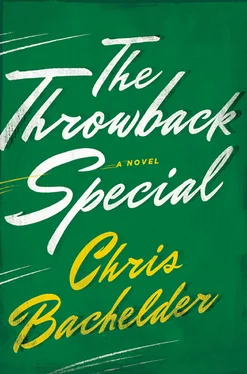REALLY, any container of appropriate size would have worked just fine. An ice bucket, a duffel bag, an empty case of beer. Just something large enough to hold twenty-two ping-pong balls. In the early years, the men used whatever was handy, and there were never any problems. But eight or nine years ago Steven showed up with a huge lottery drum that he had built in his basement. The spinning drum rested on a detachable metal frame constructed of heavy metal poles that screwed together. The drum itself was a Plexiglas barrel with a small latched door on one end, and a superfluously large crank on the opposite end. The barrel would have held four hundred ping-pong balls. The commissioner spun the drum with the crank, then unlatched the door, reached into the barrel (often up to his shoulder), and drew out a ball on which was written one of the men’s names. One half of the drum was painted blue and red, with a Giants logo, and the other half was painted burgundy and gold, with an impeccably rendered Redskins logo. Consequently, the drum was ugly. The paint seemed to be coated with a scratch-proof, high-gloss polyurethane. The two halves of the drum, like the poles of the frame, could be taken apart for storage and transportation, though the disassembled unit remained gigantic and unwieldy. When assembled, the lottery drum was immense and foreboding, just far too massive and ornate and shiny for its simple purpose. Steven kept the dismantled drum and frame in a canvas sack, and the kit was commonly mistaken, even in a hotel, for a large camping tent. The men joked that the canvas sack would work just as well as the drum it contained. The men, almost all of them, strongly disliked and disapproved of Steven’s lottery drum. They could not, it is true, fault the design or the construction. Well, yes, they could. That was exactly what they could fault. The drum was too fancy. In fact, several of the men called it Fancy Drum. It was, after all, simply a tool. “It would be like, what if I decorated my jigsaw?” Wesley said one year, though in fact he did not own a jigsaw, or any other power tools, and always had his boards cut by the grumpy associates at Home Depot after waiting twenty humiliating minutes in the wood-cutting area, during which time the automated female voice on the store intercom said, over and over, “Special assistance needed in the wood-cutting area.” The men, most of them, despised Fancy Drum based on their sense of propriety or rectitude or congruity or harmony or aptness or accordance or seemliness or fitness or meetness or concord. The drum’s crank, it was evident, had been polished. “God, there it is,” one would whisper to another. “I hate that thing.” Countless threats against Fancy Drum had been made in the past several years, and consequently there was no real surprise, and no clear suspect, when one of the poles for the frame went missing.
“That pole was here two hours ago,” Steven said to Trent, sitting on the floor of Room 324, searching the canvas sack once again.
Trent asked if the drum had been in Steven’s possession the entire time. He asked if the item was insured. He asked if Steven felt he could definitively rule out those human resource reps from Prestige Vista Solutions.
“It’s not funny,” Steven said.
“You know,” Trent said, “the drum was always great in the conference room where we had plenty of space. But this year, in here. .”
The lottery was being held this year in Room 324. The room had two queen beds with diamond stitch comforters, an orange sitting chair, a desk, a dresser, a television, a mirror, a bedside table between the beds, a standing lamp, and four sconce lights. Above one bed was a framed watercolor of fireworks over a lake. Above the other bed was, as far as Andy could tell, precisely the same framed watercolor of fireworks over a lake. He stood between the beds, staring first at one painting, then the other, looking for minuscule differences. There were no differences that he could see.
Beneath the window was a heating and cooling unit that ticked and clanked. Trent had parted the window curtains, both the heavy, scratchy primary curtain and the gauzy, membranous under-curtain so popular in hotels. The windows overlooked the dark wet parking lot. It was still raining.
Most of the men had not yet arrived in the room for the lottery. They were resting or showering or watching television in their temporary rooms. Here in 324, Gil lay on one of the beds with his eyes closed. He needed a haircut. Trent flipped through a three-ring binder of laminated menus. Steven found the missing pole for the drum’s frame.
“Here it is,” he said.
“The remote control,” Myron said, “is the dirtiest item in a hotel room.”
“Dirtier than the sheets?” Chad asked.
Andy turned from the watercolors, and there commenced a discussion of the meaning of the idiom Fish or cut bait , which all of the men were accustomed to hearing. Trent thought it was basically synonymous with When the going gets tough or maybe If you can’t stand the heat . Myron was under the impression that the expression meant that one should just do something, anything. Get involved. If you don’t want to fish, fine, but then you should at least help those who do want to fish by preparing their bait. Trent wanted to know exactly what kind of bait required cutting. Steven, sitting on the floor and assembling the frame of the lottery drum, said everyone was wrong. Trent assured the men that the keg was on its way.
The heating and cooling unit ticked and clanked. Gil’s leg twitched. That guy. His father had been a French horn player. He could sleep through anything. The men — Trent, Steven, Andy, Chad, and Myron — felt compelled by tradition to go ahead and try the shaving cream trick on Gil.
“THERE YOU ARE, Charles,” Nate called from the foot of the crowded bed.
Charles was sitting on the bed, leaning against the headboard. He waved negligibly to Nate. The room was hot and loud. The men around the bed compared their devastating commute times with a kind of pride, converting liability, momentarily, into triumph.
“Could we step outside for a minute?” Nate said.
“No,” Charles said.
Nate slid between Randy and Wesley, and then shuffled down the narrow alley between the wall and the bed. “I’m glad you’re here, Charles.”
“I like those boots,” Charles said, wondering what size they were, and whether Nate might give them to him in barter.
Nate looked down at his boots and shrugged. “Robert said I was not responsible for my thoughts,” he said. “But that doesn’t seem right to me.”
Charles could not comfortably make eye contact with Nate from his seated position. His neck ached when he looked up at such a severe angle. He felt like a child, or a baby bird. This was no position from which to adjudicate pathology. Nate had a hairy throat, and a strong, though not unpleasant scent. Charles was the expert here, and this would not do.
“Switch places with me, Nate.”
Nate climbed over Charles’s legs as Charles spun them toward the wall, and stood. “Excuse me, Gil,” Nate said. “Sorry about that.”
Now Nate sat against the headboard, and Charles stood beside and above him. This was much better.
“You can help me, right?” Nate said.
“Yes,” Charles said, “I can.”
“What I said to my wife was that I was curious. That’s all I said. Sexually curious about them. And she acted like I had a big problem.”
“Slow down,” Charles said.
“Sexual curiosity is completely normal, right?”
“Generally speaking, yes,” Charles said.
“That’s what I told her,” Nate said. “That’s exactly what I said.”
“But it does depend to some extent,” Charles said, “on the object of your curiosity.”
Читать дальше












